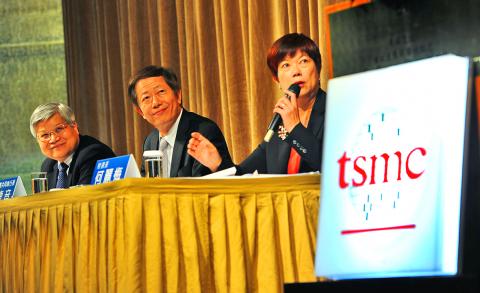Taiwan Semiconductor Manufacturing Co (TSMC, 台積電), the world’s top contract chipmaker, yesterday posted a record-high quarterly net profit for last quarter, fueled by robust demand for advanced 20-nanometer (nm) chips from Apple Inc.
Net income jumped 27.9 percent sequentially to NT$76.34 billion (US$2.51 billion) during the quarter ending Sept. 30, after the company’s gross margin climbed to an eight-year high of 50.5 percent, compared with NT$59.7 billion in the second quarter of this year. That represented an annual expansion of 46.9 percent from NT$51.95 billion.
Last quarter’s figure exceeded estimates by major foreign brokerages averaging NT$72.6 billion, with the highest projection NT$73.9 billion by Deutsche Bank.

Photo: Lo Pei-der, Taipei Times
In addition to the strong quarterly earnings, TSMC delivered some encouraging news including an earlier-than-expected ramp-up of its new 16nm technology.
TSMC expects to start mass production of the 16nm technology in the second quarter of next year at the earliest, one quarter ahead of its original estimate three months ago.
Along with big orders from clients, TSMC expects revenue from the advanced technology to make up a high single-digit percentage of its total revenue in the fourth quarter of next year, up from a low single-digit percentage estimated previously.
“This is very positive,” Deutsche Bank analyst Michael Chou (周立中) said, as TSMC has been lagging behind rivals Intel Corp and Samsung Electronics Co in ramping up 16nm technology.
TSMC is one of Deutsche Bank’s top picks in Taiwan’s semiconductor industry, giving it a “buy” rating with target price of NT$120.5.
This quarter, the chipmaker expects revenue to grow by 4 to 5 percent to somewhere between NT$217 billion and NT$220 billion, compared with NT$209.5 billion last quarter, TSMC chief financial officer Lora Ho (何麗梅) told investors.
The sequential growth surpasses a 2 percent increase forecast by Chou.
“The growth is mainly from 20nm chip demand,” Chou said. “Besides Apple, Qualcomm [Inc] also begins ordering [20nm chips] in the fourth quarter.”
Over the next two years, Ho said she expects TSMC to grow revenue by a double-digit percentage annually, as smartphones and tablets continue to drive growth.
Half of TSMC’s revenue this year would come from smartphones, she said.
“Strong demand from our 20nm SoC [system-on-chip] customers enables our continued growth in the fourth quarter, overcoming our seasonal demand pattern of a sequentially wearier fourth quarter,” TSMC co-chief executive Mark Liu (劉德音) said.
Dismissing rising concern about the semiconductor industry’s growth, Liu said: “This fourth-quarter demand from our customers invalidates the recent forecast by Microchip [Technology Inc]. Our recent demand in China still appears strong.”
The US microcontroller supplier last week cut its revenue outlook for this quarter by up to 5 percent to US$546.2 million, from its previous estimate of between US$560 million and US$575 million, blaming weak demand in China and inventory buildup.
TSMC said this year’s capital spending would be US$9.6 billion and that it had budgeted more than US$10 billion next year, mostly for 16nm and 10nm technologies.
TSMC also said it expected free cash flow to double next year from this year, enabling it to pay a bigger dividend per share.

GROWING OWINGS: While Luxembourg and China swapped the top three spots, the US continued to be the largest exposure for Taiwan for the 41st consecutive quarter The US remained the largest debtor nation to Taiwan’s banking sector for the 41st consecutive quarter at the end of September, after local banks’ exposure to the US market rose more than 2 percent from three months earlier, the central bank said. Exposure to the US increased to US$198.896 billion, up US$4.026 billion, or 2.07 percent, from US$194.87 billion in the previous quarter, data released by the central bank showed on Friday. Of the increase, about US$1.4 billion came from banks’ investments in securitized products and interbank loans in the US, while another US$2.6 billion stemmed from trust assets, including mutual funds,

Micron Memory Taiwan Co (台灣美光), a subsidiary of US memorychip maker Micron Technology Inc, has been granted a NT$4.7 billion (US$149.5 million) subsidy under the Ministry of Economic Affairs A+ Corporate Innovation and R&D Enhancement program, the ministry said yesterday. The US memorychip maker’s program aims to back the development of high-performance and high-bandwidth memory chips with a total budget of NT$11.75 billion, the ministry said. Aside from the government funding, Micron is to inject the remaining investment of NT$7.06 billion as the company applied to participate the government’s Global Innovation Partnership Program to deepen technology cooperation, a ministry official told the

Taiwan Semiconductor Manufacturing Co (TSMC, 台積電), the world’s leading advanced chipmaker, officially began volume production of its 2-nanometer chips in the fourth quarter of this year, according to a recent update on the company’s Web site. The low-key announcement confirms that TSMC, the go-to chipmaker for artificial intelligence (AI) hardware providers Nvidia Corp and iPhone maker Apple Inc, met its original roadmap for the next-generation technology. Production is currently centered at Fab 22 in Kaohsiung, utilizing the company’s first-generation nanosheet transistor technology. The new architecture achieves “full-node strides in performance and power consumption,” TSMC said. The company described the 2nm process as

Even as the US is embarked on a bitter rivalry with China over the deployment of artificial intelligence (AI), Chinese technology is quietly making inroads into the US market. Despite considerable geopolitical tensions, Chinese open-source AI models are winning over a growing number of programmers and companies in the US. These are different from the closed generative AI models that have become household names — ChatGPT-maker OpenAI or Google’s Gemini — whose inner workings are fiercely protected. In contrast, “open” models offered by many Chinese rivals, from Alibaba (阿里巴巴) to DeepSeek (深度求索), allow programmers to customize parts of the software to suit their